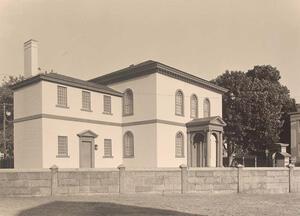Newly dedicated Newport Synagogue introduces an open-view women's gallery
A new synagogue, dedicated in Newport, Rhode Island on December 2, 1763, introduced an important innovation in synagogue design. The women’s gallery of this traditional synagogue featured a low balustrade that offered women an open view of the rest of the sanctuary.
Women’s galleries in other “new world” and “old world” synagogues generally were constructed with high or opaque barriers meant to keep women out of the sight of men within the sanctuary. The change in Newport represented less a reform of traditional practice than a reflection of colonial American expectations for female religious expression.
The strong presence of women in colonial American churches was an important way in which women demonstrated the religious piety expected of them by their society. Observing the behavior of their non-Jewish neighbors, colonial American Jewish women seemed to understand that it was more important that they be seen in the space of public worship than had been the case in their previous communities. Early American synagogue records suggest that unmarried young women both attended and asserted their presence in the synagogue.
The open gallery layout of the Newport synagogue demonstrates a changing consciousness of what women’s synagogue role should be. Moreover, the open plan was imitated by most of the early American synagogues that followed Newport.
In 1824, Rebecca Touro petitioned the Rhode Island state legislature to preserve the synagogue. At the time of her petition, no Jews were living in Newport. Now known as Touro Synagogue, the Newport building is the only synagogue building in the United States to survive from the Colonial era. Designated as a National Historic Shrine by the U.S. National Park Service in 1947, the colonial-era Touro Synagogue remains as a functioning Orthodox synagogue in the midst of modern-day Newport.
Sources: Karla Goldman, Beyond the Synagogue Gallery: Finding a Place for Women in American Judaism (Cambridge, MA, 2000); www.tourosynagogue.org.



